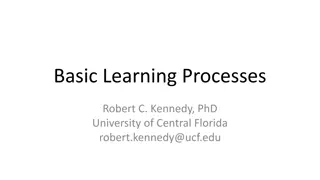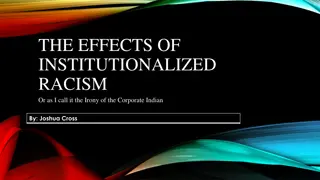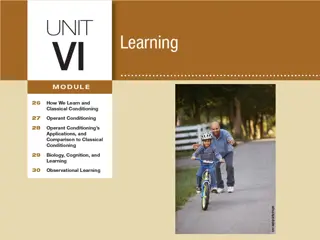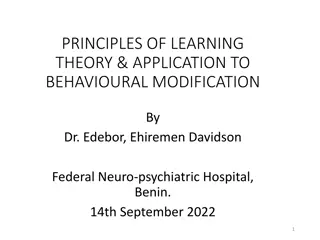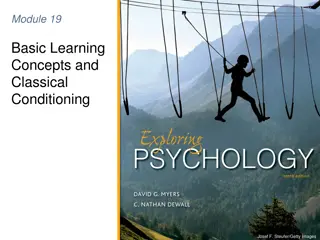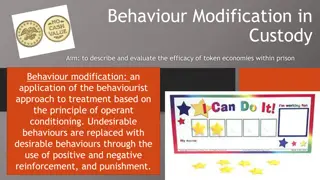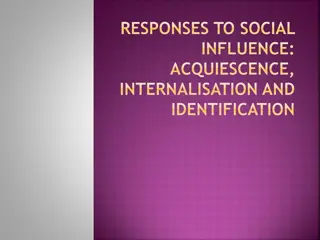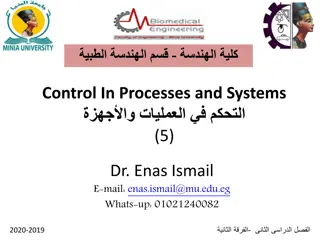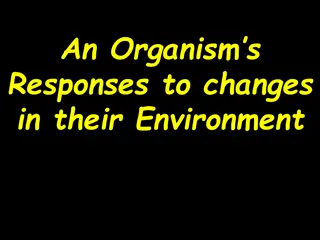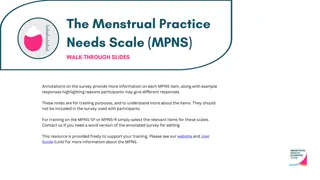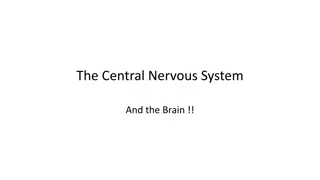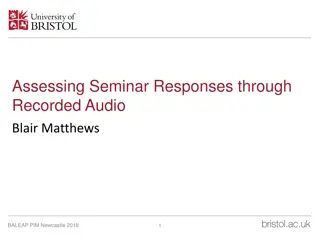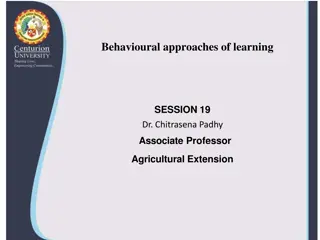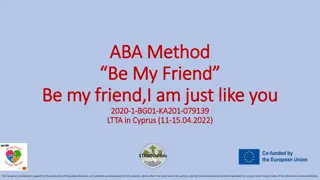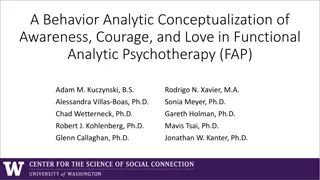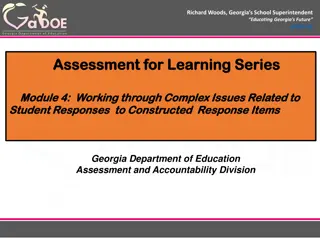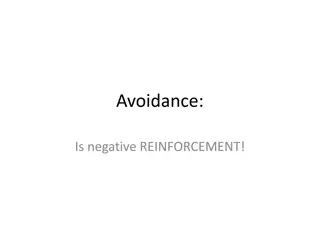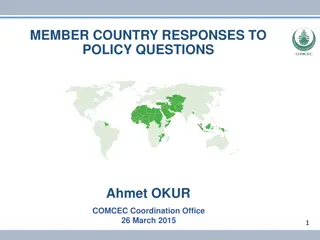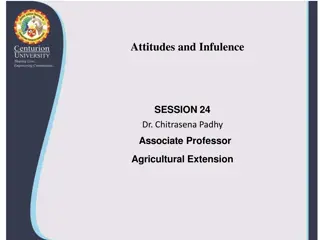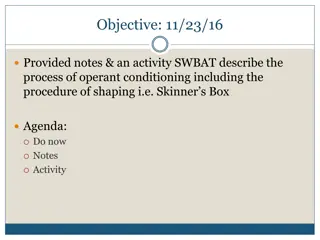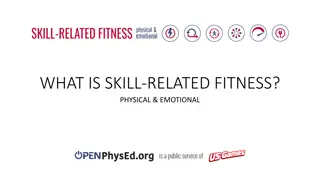Responses to NYDA Amendment Bill Submissions Presentation
The presentation addresses the Department's responses to oral and written submissions on the NYDA Amendment Bill to the Portfolio Committee. It covers the purpose, background, and key points from the submission matrix regarding the establishment, functioning, age limits for board members, provincial
0 views • 26 slides
Breathe 1-Month Survey 2021-2023 Head Start Responses Analysis
This report analyzes responses from the Breathe 1-Month Survey 2021-2023 in the Head Start program. It covers the roles of participants, frequency of material usage, usefulness of materials in tobacco education, and future likelihood of material use. Insights into the engagement and perceptions of t
0 views • 5 slides
Update on Flood Disaster Interventions and Responses to Committee's Reporting Requests
The report provides an update on flood disaster interventions since the session of the Committee on Relief and Recovery, highlighting responses received from various departments and authorities. Updates have been received from the Department of Social Development, Department of Small Business Develo
5 views • 44 slides
Stakeholders' Responses to National Health Insurance Bill [B.11B-2019]: Overview
The National Council of Provinces (NCOP) Select Committee on Health and Social Services received numerous submissions from stakeholders regarding the National Health Insurance Bill [B.11B-2019]. The report highlights both support and opposition towards the Bill, discussing key issues such as address
3 views • 44 slides
Basic Learning Processes
Explore the essential vocabulary related to operant learning and reinforcement, including terms like automatic reinforcer, conditioned reinforcer, and positive reinforcement. Gain insights into theories such as drive-reduction theory and response-deprivation theory. Enhance your knowledge of behavio
3 views • 31 slides
Proposal for Location Configuration Information (LCI) in IEEE 802.11 Beacons and Probe Responses
This document proposes the inclusion of Location Configuration Information (LCI) data in a standard information element broadcast in Beacons and Probe Responses within IEEE 802.11 networks. By enhancing the accessibility of infrastructure location to non-AP STAs, this proposal aims to simplify locat
1 views • 5 slides
Thematic Working Group for Libya Flood Responses - Updates and Coordination Efforts
Thematic Working Group for Libya Flood Responses held a meeting on 17 October 2023 to discuss coordinated responses, targeting needs and damage assessments. Updates and documents published by partners after 10 October 2023 were shared, including reports from SRSG Abdoulaye Bathily and various agenci
0 views • 10 slides
Efficient Patient Recruitment and Messaging in MyChart
Streamline your patient recruitment process in MyChart by accessing, finding eligible patients, sending messages, and tracking responses effectively. Learn how to access reports, find and select patients, send recruitment requests, send patient-facing messages, and track patient responses for resear
0 views • 7 slides
Insights from Breathe Training: Material Usage Patterns Post-Survey
Survey conducted from 2021 to 2023 segmented based on roles with 174 responses. Participants were asked about their material usage post Breathe Training completion. Find out the frequency of material utilization and insights gathered from the responses in this comprehensive survey analysis.
0 views • 28 slides
Unveiling the Effects of Institutionalized Racism on Indigenous Peoples
Delve into the intricate web of institutionalized racism faced by Indigenous communities, exploring key concepts like covert racism versus operant racism, decolonization, and settler benefits. Learn how historical injustices, such as the Indian Act, continue to impact Indigenous autonomy and the fig
9 views • 21 slides
Understanding and Applying Operant Conditioning Principles
Explore the various applications of operant conditioning in different settings such as school, sports, work, and home. Discover how reinforcement and punishment techniques can be used for self-improvement and stress management. Learn about the key differences between operant and classical conditioni
0 views • 19 slides
Understanding Principles of Learning Theory and Behavioral Modification
Explore the principles of learning theory and its application in behavioral modification, highlighting concepts such as classical and operant conditioning. Learning, defined as a permanent change in behavior due to experience, is distinguished from performance. Discover how learning potential differ
2 views • 48 slides
Examples of Classical and Operant Conditioning
Robert receiving a ticket for driving under the influence illustrates operant conditioning with negative punishments, while Chris being afraid of dogs after being bitten showcases classical conditioning with stimulus generalization. Jacob's joy from smelling his date's cologne demonstrates classical
1 views • 9 slides
Understanding Basic Learning Concepts and Classical Conditioning
Acquiring new information and behaviors through experience is known as learning. One common way we learn is through associative learning, where we connect certain events together. This process can take the form of classical conditioning, where stimuli evoke automatic responses, or operant conditioni
1 views • 14 slides
Token Economies and Behaviour Modification in Custody: Evaluating Efficacy
This article explores the application of token economies in prisons as a behaviour modification technique based on operant conditioning. Token economies involve exchanging tokens for desired behaviours, aiming to replace undesirable actions with positive reinforcement. The use of increments, consist
0 views • 19 slides
Discovery Motions in Civil Pretrial Practice
In civil pretrial practice, discovery motions play a crucial role when the opposing party fails to respond adequately to formal discovery requests. These motions include Motion to Compel, Motion to Compel Further, and Motion to Deem Facts Admitted. By filing these motions, parties can seek court ord
0 views • 17 slides
Understanding Responses to Social Influence in Psychological Context
Social influence plays a significant role in shaping human behavior, with responses such as acquiescence, internalization, and identification affecting individual conformity to group norms. Conformity reflects matching attitudes, beliefs, and behaviors to group standards, which may lead to groupthin
0 views • 16 slides
Understanding Behavioral Therapy in Psychotherapeutics
Behavioral therapy focuses on observable behavior and learning experiences to bring about change and enhance skills. It is used to treat a wide range of psychological disorders and is applicable in various fields such as developmental disabilities, education, clinical psychology, and rehabilitation.
0 views • 20 slides
Understanding Punishment in Operant Behavior
Aversive stimuli can influence operant behavior through noncontingent punishment, as seen in conditioned emotional responses like conditioned suppression. The threat of upcoming aversive events can reduce responding, highlighting the importance of conditioned emotional responses. Punishment operates
0 views • 27 slides
Understanding Superstitious Behavior Through Operant Conditioning Experiments
Explore the phenomenon of superstitious behavior through the lens of operant conditioning experiments conducted by behaviorists like B.F. Skinner. Discover how noncontingent reinforcement can lead to the development of superstitious beliefs in both humans and animals, as demonstrated in various stud
0 views • 8 slides
Understanding Time Domain Dynamic Responses in Control Systems
In the field of control systems, analyzing time domain dynamic responses is essential for evaluating system performance. This involves studying transient and steady-state responses, as well as characteristics such as steady-state error. By examining these responses to standard input signals, insight
4 views • 30 slides
Understanding Reinforcement and Association in Behavioral Psychology
This content delves into the concepts of reinforcement, association, and operant conditioning in behavioral psychology. It discusses how actions are influenced by rewards and consequences, the differences between association and reinforcement, and classical conditioning models like the Rescorla-Wagn
0 views • 8 slides
Understanding Chemistry through Open-Ended Questions
The content provides a detailed assessment of student responses to open-ended chemistry questions related to hydrogen peroxide and its applications in teeth whitening gels. Various student answers are analyzed based on their understanding of the chemistry concepts involved, with explanations given f
1 views • 18 slides
Organisms' Responses to Environmental Changes
Organisms demonstrate responses to changes in their environment through stimuli and reactions. These responses can be internal or external, leading to behaviors such as seeking food, avoiding danger, or adjusting growth patterns. Examples include animals seeking food when hungry or plants growing to
3 views • 15 slides
Enhancing Understanding of MPNS Items Through Annotations and Example Responses
Gain deeper insights into each MPNS item through detailed annotations and example responses, shedding light on potential reasons for varied participant responses. These resources are ideal for training purposes to improve comprehension of the MPNS-SF and MPNS-R scales. Contact us for editable versio
0 views • 37 slides
Understanding the Central Nervous System and Brain
The central nervous system plays a crucial role in enabling organisms to respond to stimuli and adapt to changes in the environment. Comprising receptors, neurones, and effectors, this system facilitates the detection of stimuli, transmission of messages, and appropriate responses. Neurones, includi
0 views • 18 slides
Seminar Responses Assessment Method Using Recorded Audio
Seminar responses are challenging to assess due to group dynamics. A novel approach involves students watching seminar excerpts and recording responses as if present. The method is practical and aids in assessing language skills effectively. This study delves into the practicability and language ass
0 views • 17 slides
Understanding Behavioral Approaches of Learning
The behavioral approach to learning examines how observable behaviors are influenced by environmental factors. It emphasizes the role of stimuli and reinforcement in shaping behavior through classical and operant conditioning. Classical conditioning, illustrated by Pavlov's dogs, involves associatio
0 views • 9 slides
Effect of Efgartigimod on Humoral Vaccine Responses in Patients with Autoimmune Diseases
The study explores the impact of Efgartigimod, a Neonatal Fc Receptor blocker, on humoral vaccine responses in patients with autoimmune diseases. It discusses how immunosuppressive therapies used in autoimmune disorders may affect susceptibility to infections and impair vaccine immunogenicity, highl
0 views • 18 slides
Emergency Medical Services System Collaborative Meeting Highlights
Highlights from the Emergency Medical Services System Collaborative Meeting on April 5, 2018, including introductions, ReddiNet bed availability for MCI response, monthly notices and responses, year-to-date alerts and responses, patient distribution, bed availability reporting for February and March
0 views • 66 slides
Introduction to Applied Behavior Analysis (ABA): Basics and Applications
ABA is a systematic approach that aims to improve behaviors through reinforcement strategies, focusing on operant conditioning principles. It targets various groups like toddlers, school-aged children, teens, and young adults. ABA is widely used for disorders such as substance use disorder, eating d
0 views • 30 slides
Understanding Functional Analytic Psychotherapy (FAP) Concepts
Delve into the Behavior Analytic Conceptualization of Awareness, Courage, and Love in Functional Analytic Psychotherapy (FAP). Explore the principles of FAP, including clinically relevant behaviors, the therapeutic relationship, and the five rules guiding the practice. Discover how FAP targets behav
0 views • 21 slides
Understanding Constructed Response Items in Education
Exploring the concept of constructed response items in education, this content delves into the complexities of student responses, assessment for learning, rubric development, and differentiation strategies. Richard Woods, Georgia's School Superintendent, provides insights on how to navigate through
0 views • 31 slides
Understanding Avoidance Behavior and Its Theories
Avoidance behavior involves negative reinforcement to increase the frequency of operant responses, not punishment. Different types of avoidance tests, such as discriminated avoidance and shuttle avoidance, are used to study negative reinforcement. The Two-Factor Theory of avoidance conditioning expl
0 views • 61 slides
Basics of Learning: Classical and Operant Conditioning Overview
Types of learning include classical conditioning, operant conditioning, and observational learning. Classical conditioning involves pairing a neutral stimulus with a meaningful one to elicit a response. Operant conditioning focuses on how consequences influence behavior. Terminology like UCS, UCR, N
0 views • 66 slides
Understanding Motivation and Change in Fall 2013
Delve into the various aspects of motivation and change in Fall 2013, exploring theories like Achievement Motivation Theory, Self-Determination Theory, Operant Conditioning, and Motivational Interviewing. Discover the complexities of motivating individuals and draw inspiration from historical events
0 views • 130 slides
Member Country Responses to Policy Questions on Export Credit Agencies
The document explores responses from various member countries regarding their use of Eximbank/Export Credit Agencies, plans for expanding business scope, cooperation with other institutions, and challenges faced by their respective agencies. Countries like Turkey, Oman, Indonesia, and more share ins
0 views • 18 slides
Understanding Attitudes and Influence in Behavior Formation
Attitudes are influenced by various factors such as experience, social roles, conditioning, and observation. They can be learned through classical and operant conditioning and by observing others. However, attitudes do not always align with behavior. Factors influencing attitude strength include exp
0 views • 16 slides
Understanding Operant Conditioning: The Process and Importance
Operant conditioning is a type of learning where behavior is influenced by its consequences. This process, famously studied by B.F. Skinner, involves shaping behavior through reinforcement or punishment. By understanding how behaviors are reinforced or diminished, we can better comprehend how volunt
0 views • 36 slides
Understanding Skill-Related Fitness: Physical and Emotional Aspects
Skill-related fitness encompasses both physical and emotional components, such as agility, balance, coordination, power, reaction time, and speed. Physical agility involves quick body movements, while emotional agility relates to positive responses in various situations. Physical balance requires we
0 views • 7 slides



![Stakeholders' Responses to National Health Insurance Bill [B.11B-2019]: Overview](/thumb/69945/stakeholders-responses-to-national-health-insurance-bill-b-11b-2019-overview.jpg)
